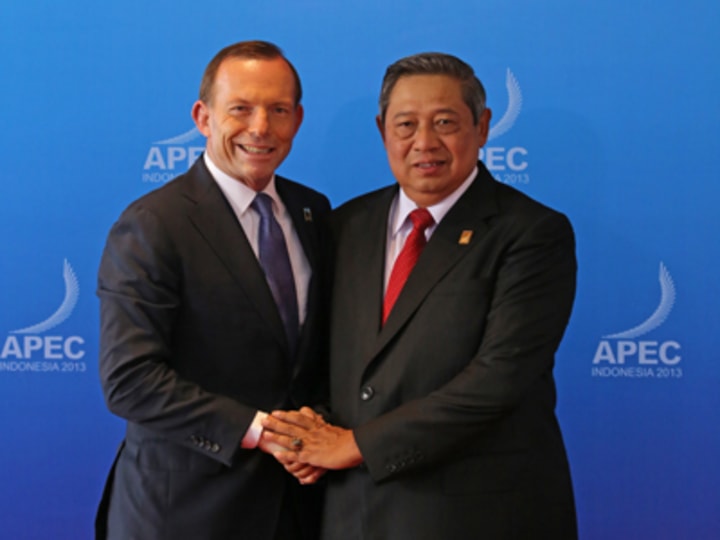
Relations between Canberra and Jakarta have sunk to their lowest point in more than a decade, following last month’s revelations that Australian intelligence agencies had tapped the phones of Indonesian President Susilo Bambang Yudhoyono and his closest advisers.
In the weeks since the allegations first surfaced, Jakarta has recalled its ambassador in Canberra, suspended cooperation with the Australian military and announced a downgrading in bilateral ties with Australia.
“Downgrading includes reviewing all bilateral cooperation between the two countries — not only information and intelligence exchange. It’s no longer business as usual,” Indonesian Foreign Minister Marty Natalegawa emphasized on Nov. 19.
The Yudhoyono administration, has, thus far, kept its hands off Australia’s foreign aid program in Indonesia. Keen on limiting the damage to its bilateral relationship with Canberra, the administration is likely to press ahead in its development cooperation with Australia, Indonesia experts have told Devex.
“President Yudhoyono has been careful in selecting the target for reprisals, limiting them to defense and security cooperation,” Endy Bayuni, a Jakarta-based political analyst and former chief editor of the Jakarta Post, said. “He understands very well that many of the Australian economic aid programs are important.”
Even in a scenario where new spying allegations lead to a further escalation of tensions, Andrew Rosser, an associate professor at the University of Adelaide, is optimistic that Yudhoyono still wouldn’t go after the Australian aid program.
“If that scenario materializes, I would imagine that Yudhoyono would be reluctant to suspend aid cooperation because it is currently at the center of the relationship,” Rosser said.
Despite Jakarta’s recent transition to middle-income status, even Indonesian government officials concede that foreign aid — especially from its largest bilateral grant donor, Australia — remains critical to addressing the country’s development challenges. More than 120 million Indonesians or over half of the population live on less than $2 a day.
Reaction in Canberra
For now, at least, Prime Minister Tony Abbott’s government in Canberra is resisting calls to reconsider and even reduce its assistance to Indonesia in light of the diplomatic spat with Jakarta. Since 2011, Indonesia has been the largest recipient of Australian aid.
In the aftermath of devastating floods in Queensland nearly three years ago, then opposition leader Abbott had urged the Gillard government to shelve its flagship aid initiative in Indonesia — the Australia-Indonesia Education Partnership — in order to pay for relief efforts.
Eager to mend ties with Indonesia — a country of immense geostrategic importance to Australia — Abbott is unlikely to wield the ax on Canberra’s aid program in the country in the current climate, insiders within his coalition say.
“I think it would be very unlikely at this time that there’d be any significant decline in the level of support,” Russell Trood, former chair of the Australian Senate’s foreign affairs committee, said. “If it were to occur, it would likely run the risk of seeming to be a retaliation for Indonesia’s response and that’s the last thing that the Abbott government would want.”
All these said, the Abbott government has indicated that it has no plans to substantially grow the Australian aid budget for Indonesia, which stands at 647 million Australian dollars ($592 million) for the current fiscal year of 2013-14. Its spending plans — released in September — set in motion only modest increases in Australian aid spending through 2017.
In contrast, the Gillard Labor government’s comprehensive aid policy framework, which was released in May 2012, forecast Australian aid spending in Indonesia would grow to AU$950 million by 2015-16.
Over the past decade, both Labor and center-right governments in Canberra had presided over a fourfold increase in Australian aid in Indonesia — in large part due to the response to the 2004 Indian Ocean tsunami that struck Indonesia’s Aceh province. Polls suggest Indonesian attitudes toward Australia improved markedly as a result of its leadership role in the tsunami relief effort.
Uncertainty after Yudhoyono
Yet even as the Australian aid program in Indonesia presses on, many fear that the erosion of trust between Jakarta and Canberra could very well hinder effective development cooperation between the two countries in the years to come.
“I don’t think we should underestimate the genuine resentment that this has caused in Jakarta particularly amongst officials and even with [Susilo Bambang Yudhoyono] himself,” Trood asserted. “At the core of the Indonesian reaction is humiliation and resentment about fact that [the spying] has taken place.”
According to Rosser, Australian aid officials might even find it harder to gain access to senior Indonesian government officials. Earlier this year, an audit report from the Australian National Audit Office found that the Australian aid officials had established “good working relationships” with their Indonesian counterparts.
And in advance of presidential elections in July 2014, there is even greater uncertainty over just what a new administration in Jakarta might mean for Australia’s aid engagement with Indonesia. Notwithstanding recent tensions, over his nearly 10 years as president, the term-limited Yudhoyono has built a reputation in Canberra as a steady and reliable development partner.
The stridently nationalist Indonesian Democratic Party for Struggle of former President Megawati Sukarnoputri is currently favored to unseat Yudhoyono’s Democratic Party from power. Against the backdrop of Indonesia’s rising economic standing, few expect the eventual standard bearer of Sukarnoputri’s party to be as receptive to Australian aid engagement as Yudhoyono.
“Most Indonesia watchers think we have gone through a kind of halcyon period of cooperation born in part by the reality of SBY’s presidency. There is a measure of apprehension in Canberra about what might come next,” Trood said.
Read more:
Like what you’ve just read? This is just a sample of the news, insight and analysis we provide hundreds of Executive Members around the world. Executive Members are leaders in global development who are shaping and innovating the business of development to make the world a better place. Become a Devex Executive Member.
